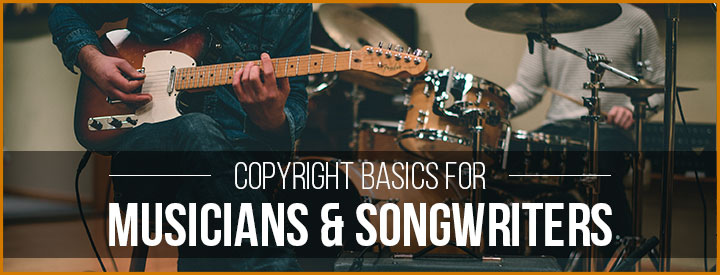Copyright Basics for Musicians and Songwriters
If anyone could just take your music without permission and use it without compensating you, chances are many of us would not go to great lengths to create music and other art.
Fortunately, copyrights exist to motivate and compensate musicians and songwriters to create the art that so greatly enriches our lives. By understanding the basics, musicians and artists can avoid a lot of problems and even use copyright protections to their advantage.
In the United States, copyrights are intended to provide legal protection to creative works of authorship, like songs, sound recordings or music videos, for a limited time. If you own a copyright, you have the exclusive right to:
- Create copies of your work
- Distribute copies of your work
- Adapt your work, also referred to as “derivative works”
- Perform your work publicly
- Display your work publicly; this applies mainly to visual artists, not musicians or songwriters
- Digitally transmit sound recordings of your work
These rights are not necessarily absolute, but generally people have to ask for your permission to use your copyright. If they do not, they are likely committing copyright infringement and can be legally liable to you. So, if you own the rights to a song, people need to get your permission to play your song in a club in front of people, incorporate your song into a television show or movie, or play your song on the radio.
If you are a musician that performs or records music written by other people, the owners of those songs have to give permission for you to do so.
Given that you cannot personally police all uses of your copyright, a number of organizations exist to handle some of them on your behalf. In the U.S., those organizations are:
- ASCAP, BMI and SESAC. These are called performing rights organizations. They collect royalties from radio stations, TV stations, restaurants and performance venues for your song getting played live or by recording. Musicians often do not have to pay to perform other people’s songs in performance venues because the venue owners pay a “blanket license” to these performing rights organizations.
- The Harry Fox Agency issues what are called “mechanical licenses” and collects royalties in the process. A mechanical license gives you the right to make a sound recording of someone else’s song, meaning recording a cover version. We’ll look more at mechanical licenses later.
- SoundExchange collects royalties from Internet radio, satellite radio, and cable radio stations for playing your sound recordings. The royalties are divided among the copyright owners, featured and non-featured artists like session musicians.
To copyright your song, sound recording or music video, it has to be original and “fixed” in something tangible.
Originality means you did not copy someone else’s creative work and your work has more than a basic level of creativity. For example, playing an ascending and descending C-major scale most likely cannot be copyrighted because it is so common that there is no creativity to it.
“Fixed” in something tangible means that your song has to be written down or captured in a sound recording or music video. Sound recordings and music videos are automatically fixed because they are captured on tapes, discs or hard drives.
Many people have the mistaken belief that they have to register with the Copyright Office to get a copyright, but that is not true. You own a copyright as soon as you write down or record your song, make a sound recording or make a music video.
Be aware that you cannot copyright ideas. This is why it is good to regularly write your songs down or record them.
Copyright can be complicated and every situation is different, but there are simple and inexpensive things you can do to protect your interests, which we will explore over the course of future posts.
Next time we will discuss more in depth some of the limitations to the exclusive rights provided by copyrights.
This article should be considered a general discussion of copyright law and is not to be taken as personal legal advice to the reader. Please hire an attorney experienced in copyright law to provide the advice you may need for your particular situation.
FONTE: https://reverb.com/news/copyright-basics-for-musicians-and-songwriters
Julian Ludwig é diretor do Pro Áudio Clube, produtora de áudio Jacarandá, Loc On Demand e Jacarandá Licensing. Trabalhou para empresas como: Guaraná Antartica, TV Gazeta, NET, Chivas Regal, FNAC, Prefeitura de São Paulo, Mukeca Filmes, Agência LEW’LARA TBWA, Agencia MPM, Agência Content House entre outras. Fez trilhas para programas de TV como: Internet-se (Rede TV), Você Bonita (TV Gazeta), Mix Mulher (TV Gazeta), Os Impedidos (TV Gazeta), Estação Pet (TV Gazeta), CQC (TV Band) Vinheta Oficial TV Gazeta, entre outras. Também atuou em vários longas e curtas metragens, incluindo mixagem em 5.1 e serviços de pós-produção.

